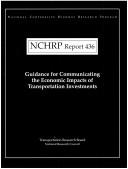| Listing 1 - 10 of 79 | << page >> |
Sort by
|
Book
Year: 1999 Publisher: Washington, DC : World Bank,
Abstract | Keywords | Export | Availability | Bookmark
 Loading...
Loading...Choose an application
- Reference Manager
- EndNote
- RefWorks (Direct export to RefWorks)
December 2000 Do state holding companies promote the success of private participation in the water sector? Apparently not, judging from experience in four African countries. There are very few functions that state holding companies are better suited for performing than other entities are. When the Gambia, Guinea, and Senegal decided to involve the private sector in the provision of water services, they also established state holding companies--state-owned entities with exclusive or partial responsibility for: * Owning infrastructure assets. * Planning and financing investments (replacing assets and expanding networks). * Regulating the activities of the private operator. * Promoting public acceptance of private participation in the sector. In Côte d'Ivoire, by contrast, when private participation was introduced (in 1960), no state holding company was established. To determine whether state holding companies help private participation in the water sector succeed, Kerf reviews the four functions these entities are expected to perform in the Gambia, Guinea, and Senegal. In light of experience in all four countries, he examines whether, and under what circumstances, state holding companies might be the entities best suited for carrying out such functions. He concludes that creating a state holding company is often not the best solution. A state holding company might be better suited than other entities for planning and financing investments when (and only when): * Investment responsibilities cannot be transferred to the private operator. * Tariffs are insufficient, at least for a time, to cover investment needs, so it is crucial that a public entity have access to other sources of finance. * The holding company's financial strength and accountability, or its incentives and ability to promote the gradual adoption of cost-covering tariffs, are superior to those of a ministerial department. When one or more of these conditions are not met, the main investment responsibilities should be transferred to the private operator or, if that is not possible, left to the government itself. The other three functions should not, as a general rule, be performed by a state holding company. This paper--a product of the Private Sector Development and Infrastructure Vice Presidency--is part of a larger effort to analyze the factors that contribute to the success of private participation in infrastructure. The author may be contacted at mkerf@worldbank.org.
Book
Year: 1999 Publisher: Washington, DC (1818 H St., NW, Washington 20433) : World Bank, World Bank Institute, Governance, Regulation, and Finance Division,
Abstract | Keywords | Export | Availability | Bookmark
 Loading...
Loading...Choose an application
- Reference Manager
- EndNote
- RefWorks (Direct export to RefWorks)
Book
ISBN: 9051667205 9789051667202 Year: 1999 Publisher: Delft Eburon
Abstract | Keywords | Export | Availability | Bookmark
 Loading...
Loading...Choose an application
- Reference Manager
- EndNote
- RefWorks (Direct export to RefWorks)
Operational research. Game theory --- harbors --- port infrastructure

ISBN: 0896293203 Year: 1999 Publisher: Washington International food policy research institute
Abstract | Keywords | Export | Availability | Bookmark
 Loading...
Loading...Choose an application
- Reference Manager
- EndNote
- RefWorks (Direct export to RefWorks)
Agriculture --- Infrastructure (Economics) --- Rural development --- Economic aspects

ISBN: 0309066190 Year: 1999 Publisher: Washington National academy press
Abstract | Keywords | Export | Availability | Bookmark
 Loading...
Loading...Choose an application
- Reference Manager
- EndNote
- RefWorks (Direct export to RefWorks)
Infrastructure (Economics) --- Transportation --- Public relations --- Finance
Book
ISBN: 1282914979 9786612914973 1843745569 Year: 1999 Publisher: London : Thomas Telford,
Abstract | Keywords | Export | Availability | Bookmark
 Loading...
Loading...Choose an application
- Reference Manager
- EndNote
- RefWorks (Direct export to RefWorks)
Simon R. Workman examines the financial and legal concepts involved in negotiating a contract, raising capital in the markets, managing project risks and the legal frameworks likely to be encountered in different parts of the world.
Building --- Engineering --- Infrastructure (Economic) --- Loans. --- Infrastructure (Economics) --- Public works --- Finance, Public --- Finance. --- Finance --- Law and legislation.
Book
ISBN: 1280005394 9786610005390 0585261229 Year: 1999 Publisher: Washington, D.C. : World Bank,
Abstract | Keywords | Export | Availability | Bookmark
 Loading...
Loading...Choose an application
- Reference Manager
- EndNote
- RefWorks (Direct export to RefWorks)
Economic development projects --- Economic development projects --- Infrastructure (Economics) --- Infrastructure (Economics) --- Municipal finance --- Municipal finance --- Finance. --- Finance.
Book
Abstract | Keywords | Export | Availability | Bookmark
 Loading...
Loading...Choose an application
- Reference Manager
- EndNote
- RefWorks (Direct export to RefWorks)
725.4 --- 338.246 --- 336.6 --- Public finance --- Economic infrastructure
Book
Year: 1999 Publisher: Nederlands Architektuurinstituut Rotterdam
Abstract | Keywords | Export | Availability | Bookmark
 Loading...
Loading...Choose an application
- Reference Manager
- EndNote
- RefWorks (Direct export to RefWorks)
Architecture --- spoorweginfrastructuur --- Netherlands --- architecture [discipline] --- bullet trains --- railroads [infrastructure]
Periodical
Year: 1999 Publisher: Santiago de Chile : CEPAL, División de Recursos Naturales e Infraestructura,
Abstract | Keywords | Export | Availability | Bookmark
 Loading...
Loading...Choose an application
- Reference Manager
- EndNote
- RefWorks (Direct export to RefWorks)
Natural resources --- Infrastructure (Economics) --- Natural resources. --- Latin America.
| Listing 1 - 10 of 79 | << page >> |
Sort by
|

 Search
Search Feedback
Feedback About UniCat
About UniCat  Help
Help News
News